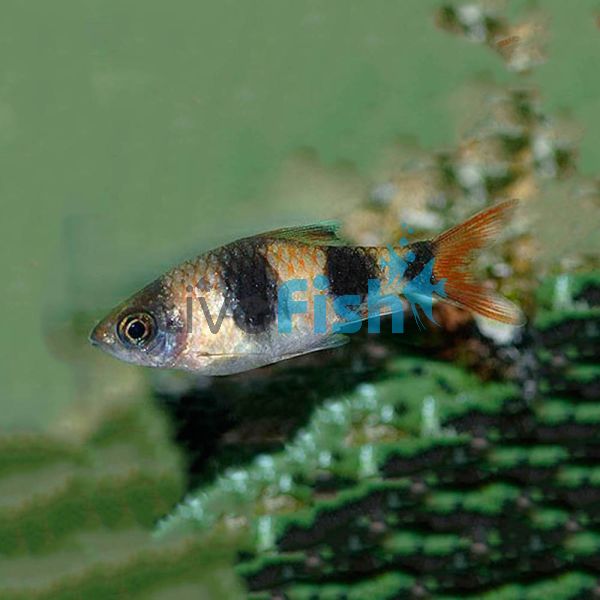Arulius Barb 3cm
The Arulius barb makes for a great, wild-looking species to fill our larger aquariums. When it comes to finding a suitable barb species that grows to a medium size it can often be quite difficult. Usually, this ends up in finding a fish that is too small such as a gold barb, or gets far too big like a tinfoil barb. However, the arulius barb meets the perfect middle ground as it grows to a size of 12 cm with a round stocky body. These are also hardy, versatile, and easy to care for species as long as they have a suitable aquarium.
Arulius Barb
The Arulius barb makes for a great, wild-looking species to fill our larger aquariums. When it comes to finding a suitable barb species that grows to a medium size it can often be quite difficult. Usually, this ends up in finding a fish that is too small such as a gold barb, or gets far too big like a tinfoil barb. However, the arulius barb meets the perfect middle ground as it grows to a size of 12 cm with a round stocky body. These are also hardy, versatile, and easy to care for species as long as they have a suitable aquarium.
Arlius barbs are really underrated for their subtle but striking colouration. They fall into the classic case of looking quite bland as juveniles which often turns a lot of aquarists away, however as these fish mature their array of colours really comes out. As adults, these fish have a blend of colours which include orange, white, green, blue, red, and white. They usually have a dark blue face which transitions to a jade green colour in their midsection to end in a rusty orange colour near the tail. The tips of the fins carry a vibrant red colour and for added contrast, these are jet black, botches that travel across the body. In males, these colours are especially vibrant and they can also develop streamer-like extensions on the dorsal fin which look stunning.
The arulius barb is a fantastic schooling fish that will look stunning in a group of about 6 or more. They move together cohesively and in a larger aquarium they can add a tonne of activity and life. Breeding these fish in captivity is surprisingly quite easy. Females will scatter their eggs across plants out the substate which males then fertilize. The parents however will potentially eat the eggs in a dedicated grow-out aquarium would be ideal.
Tank Recommendations for your Arulius Barb
The arulius barb is a constantly active species that love a large, lengthy aquarium. The minimum aquarium size for these fish would be 200 liters to really ensure a school of these fish can be kept.
This species will also appreciate an open water aquascape however adding in tall pieces of driftwood and plants can really add some Beth to the aquarium as this fish swims around them. The substrate choice is not a major concern however having a sandy base would be great as these fish may sift through the surface looking for food. These are also tropical fish that are best kept at 24-26 degrees.
Suitable Tank Buddies
The arulius barb is a very peaceful species that will thrive in a community aquarium, they can be kept with a wide range of aquarium fish with little concern of predation.
Usually Compatible
Cherry barbs, corydoras, gold barbs, angelfish, torpedo barbs, platies, siamese algae eaters, and more community fish.
Sometimes Compatible
semi-aggressive South American cichlids like convicts or fire mouths. Any larger but slow and peaceful South American species may also be outcompeted by the arulius barb such as Severums.
Rarely Compatible
Any nano fish like endler guppies and shrimp may become an easy meal for these fish. Any species which could predate on the arulius barb should be avoided as well.
Feeding your Arulius
The arulius barb should take to a wide range of aquarium foods. These fish in the wild feed on a range of foods including plant, insect, and protein matter o giving them a varied diet would be great.
The ideal diet would be a good quality pellet or flake food, supplemented with frozen bloodworms or black worms. They can also be fed live foods such as baby brine shrimp which they will appreciate.
| Scientific Name | Puntius arulius |
|---|




